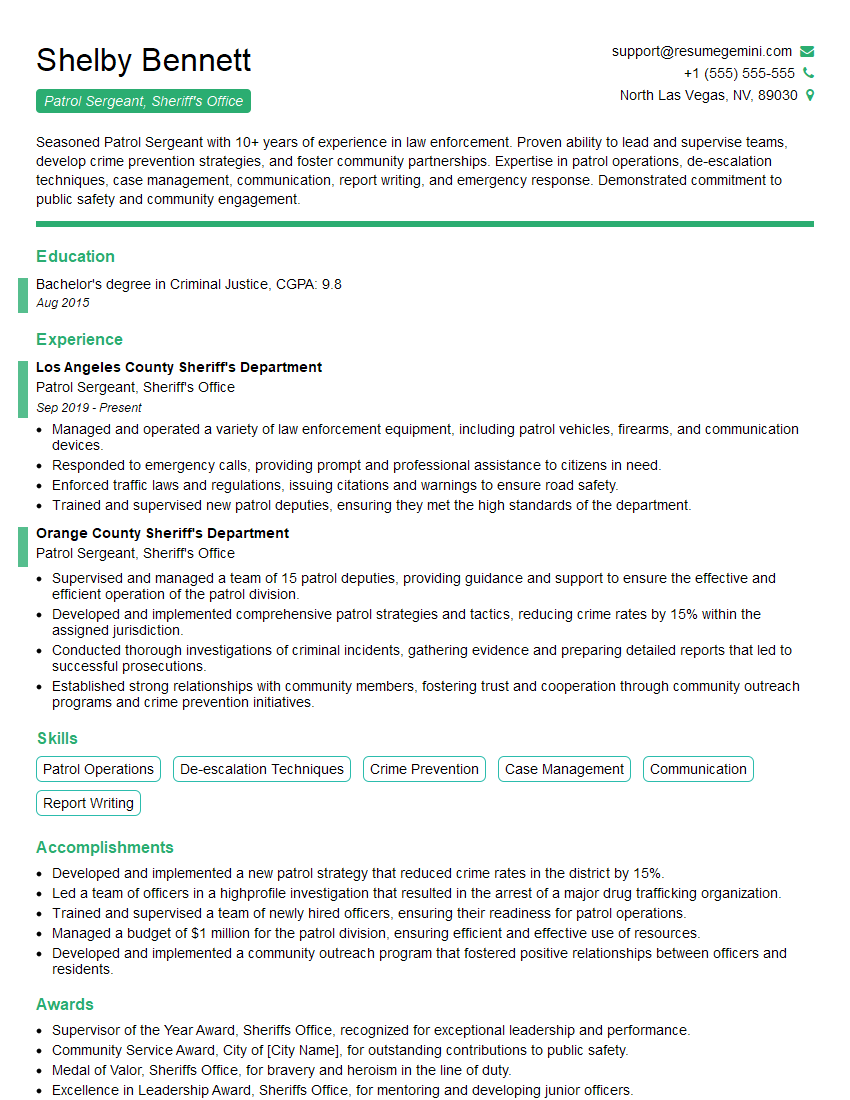Are you a seasoned Patrol Sergeant, Sheriff’s Office seeking a new career path? Discover our professionally built Patrol Sergeant, Sheriff’s Office Resume Template. This time-saving tool provides a solid foundation for your job search. Simply click “Edit Resume” to customize it with your unique experiences and achievements. Customize fonts and colors to match your personal style and increase your chances of landing your dream job. Explore more Resume Templates for additional options.

Shelby Bennett
Patrol Sergeant, Sheriff’s Office
Summary
Seasoned Patrol Sergeant with 10+ years of experience in law enforcement. Proven ability to lead and supervise teams, develop crime prevention strategies, and foster community partnerships. Expertise in patrol operations, de-escalation techniques, case management, communication, report writing, and emergency response. Demonstrated commitment to public safety and community engagement.
Education
Bachelor’s degree in Criminal Justice
August 2015
Skills
- Patrol Operations
- De-escalation Techniques
- Crime Prevention
- Case Management
- Communication
- Report Writing
Work Experience
Patrol Sergeant, Sheriff’s Office
- Managed and operated a variety of law enforcement equipment, including patrol vehicles, firearms, and communication devices.
- Responded to emergency calls, providing prompt and professional assistance to citizens in need.
- Enforced traffic laws and regulations, issuing citations and warnings to ensure road safety.
- Trained and supervised new patrol deputies, ensuring they met the high standards of the department.
Patrol Sergeant, Sheriff’s Office
- Supervised and managed a team of 15 patrol deputies, providing guidance and support to ensure the effective and efficient operation of the patrol division.
- Developed and implemented comprehensive patrol strategies and tactics, reducing crime rates by 15% within the assigned jurisdiction.
- Conducted thorough investigations of criminal incidents, gathering evidence and preparing detailed reports that led to successful prosecutions.
- Established strong relationships with community members, fostering trust and cooperation through community outreach programs and crime prevention initiatives.
Accomplishments
- Developed and implemented a new patrol strategy that reduced crime rates in the district by 15%.
- Led a team of officers in a highprofile investigation that resulted in the arrest of a major drug trafficking organization.
- Trained and supervised a team of newly hired officers, ensuring their readiness for patrol operations.
- Managed a budget of $1 million for the patrol division, ensuring efficient and effective use of resources.
- Developed and implemented a community outreach program that fostered positive relationships between officers and residents.
Awards
- Supervisor of the Year Award, Sheriffs Office, recognized for exceptional leadership and performance.
- Community Service Award, City of [City Name], for outstanding contributions to public safety.
- Medal of Valor, Sheriffs Office, for bravery and heroism in the line of duty.
- Excellence in Leadership Award, Sheriffs Office, for mentoring and developing junior officers.
Certificates
- POST Certified
- FTO Certified
- CPR and First Aid Certified
- Taser Certified
Career Expert Tips:
- Select the ideal resume template to showcase your professional experience effectively.
- Master the art of resume writing to highlight your unique qualifications and achievements.
- Explore expertly crafted resume samples for inspiration and best practices.
- Build your best resume for free this new year with ResumeGemini. Enjoy exclusive discounts on ATS optimized resume templates.
How To Write Resume For Patrol Sergeant, Sheriff’s Office
- Highlight your leadership and management skills, emphasizing your ability to motivate and guide a team of deputies.
- Showcase your expertise in patrol operations, detailing your strategies for crime prevention and response.
- Quantify your accomplishments whenever possible, using specific metrics to demonstrate the impact of your work.
- Emphasize your commitment to community engagement and your ability to build strong relationships with the public.
Essential Experience Highlights for a Strong Patrol Sergeant, Sheriff’s Office Resume
- Supervise and manage a team of patrol deputies, providing guidance, support, and performance evaluations
- Develop and implement comprehensive patrol strategies and tactics to reduce crime rates and enhance public safety
- Conduct thorough investigations of criminal incidents, gather evidence, and prepare detailed reports that lead to successful prosecutions
- Establish and maintain strong relationships with community members through outreach programs and crime prevention initiatives
- Manage and operate a variety of law enforcement equipment, including patrol vehicles, firearms, and communication devices
- Respond to emergency calls, providing prompt and professional assistance to citizens in need
- Train and supervise new patrol deputies, ensuring they meet the high standards of the department
Frequently Asked Questions (FAQ’s) For Patrol Sergeant, Sheriff’s Office
What are the primary responsibilities of a Patrol Sergeant?
Patrol Sergeants are responsible for supervising and managing patrol deputies, developing crime prevention strategies, conducting investigations, and responding to emergency calls. They also play a crucial role in community engagement and public safety initiatives.
What are the educational requirements for becoming a Patrol Sergeant?
Typically, a Bachelor’s degree in Criminal Justice or a related field is required to become a Patrol Sergeant. Some departments may also require additional law enforcement training or experience.
What skills are essential for a successful Patrol Sergeant?
Patrol Sergeants should possess strong leadership and management skills, expertise in patrol operations and crime prevention, proficiency in communication and report writing, and a commitment to public safety and community engagement.
What is the career path for a Patrol Sergeant?
With experience and additional training, Patrol Sergeants can advance to higher ranks within the Sheriff’s Office, such as Lieutenant, Captain, or Sheriff.
What is the salary range for a Patrol Sergeant?
The salary range for a Patrol Sergeant varies depending on factors such as experience, location, and department size. According to Salary.com, the average salary for a Patrol Sergeant in the United States is around $75,000 per year.